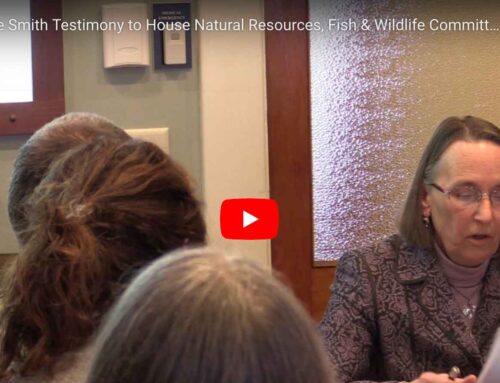|
Sen. John Rodgers (D-Essex-Orleans) said they’ve had more luck in the Senate, where President Pro Tempore John Campbell has allowed such bills to reach the floor. Rodgers is co-sponsoring a bill to ban large wind projects, S.210, with Sen. Robert Starr (D-Essex-Orleans).
Attorney General’s Statement
A statement from Attorney General William Sorrell and Assistant Attorney General John Treadwell indicates that the PSB has the authority to determine the conduct of the people who appear before it.
“Neither the PSB nor the Vermont Supreme Court have complained to this Office regarding Ms. Smith’s conduct. The complainant has not alleged that any of Ms. Smith’s conduct has harmed any individual,” Sorrell and Treadwell wrote.
“The prohibition of the unauthorized practice is intended to protect the public and society, not lawyers,” Sorrell and Treadwell wrote. But the 54-year-old definition of what that means does not take into account “the modern reality” of advocacy before judicial and quasi-judicial boards created since its adoption, they continued.
Echoing the sentiment of folks gathered in Smith’s support at the State House, Sorrell and Treadwell wrote that clarification of the scope of the practice of law is needed.
“Any definition of the practice of law must recognize the diversity of advocacy before different forums at the state and local levels, should not abridge First Amendment rights, and should insure that Vermonters have access to justice,” Sorrell and Treadwell wrote.
“Undemocratic Process”
Smith recounted her shock at hearing that the Attorney General actually wanted to investigate her for a crime and then said that participating in a PSB hearing is as close a thing to punishment as she could imagine.
“Every minute that I have to spend involved with the Public Service Board process is akin to torture,” Smith said.
The effect of the investigation has been to “expose what an undemocratic process we have,” Smith said.
It has also brought attention to the tactics of the wind industry, she said. “We have Vermonters who have been silenced,” Smith said.
Smith asked people whose lives have been negatively impacted by industrial wind projects to step forward and speak about their experiences.
Don and Shirley Nelson, who once lived nearby the Lowell project, can’t speak about their experience, due to a gag order in their settlement agreement with Green Mountain Power (GMP). Smith challenged GMP to drop that order.
“It’s like we don’t exist,” said Luann Therrien, whose family abandoned their Sheffield home to avoid the health impacts of living too close to industrial wind towers.
“The Public Service Board, in my professional opinion, is an abusive process,” Smith said. “It is abusive to the people who participate. It does not provide protections for pro se parties.”
Smith repeated a comment by Chris Recchia, Commissioner of the Department of Public Service, who said during a solar siting meeting that, “It is brutal.”
The siting of renewable energy projects needs to move to the Act 250 process, Smith said.
Two attorneys — Brooke Dingledine and Stephanie Kaplan — agreed. Dingledine said the PSB’s consideration of the opinions of towns is meaningless and can be disregarded in support of the “public interest,” which she called the “trump card.”
“If it’s renewable… then it is automatically in the public interest,” Dingledine said.
If renewable energy projects had to go before Act 250, Kaplan said, there would be two main differences. The developers would have to comply with town and regional plans, Kaplan said, and there is no criterion for the public interest.
Smith said she recorded the chair of the Sudbury planning commission asking a PSB hearing officer at a site visit what defines the public interest. She did not like the answer. The “public good is determined by whoever the voters elect in as governor.”
“We can work together to site renewable energy,” Smith said. That said, “we really shouldn’t be building wind in Vermont at all.”
|





Annette,
Congratulations. You are absolutely correct in characterizing the PSB process as brutal. The developers’ lawyers, abetted by the board, do their best to discourage *any* pro se participation. “Public interest” should more correctly be called “political interest” and “monetary interest” of the politically connected.
Keep up the good work you are doing. You obviously frighten the bullies.